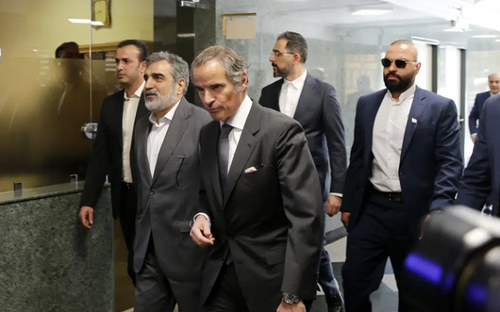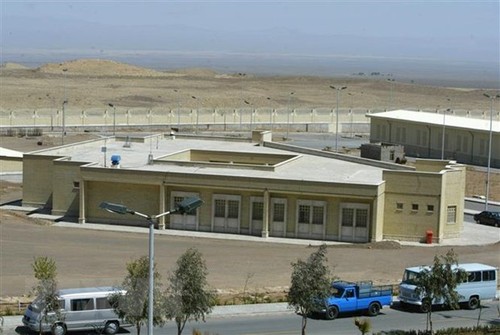 IAEA Director General Rafael Grossi (Center) and AEOI Director Mohammad Eslami (2nd from left) in Tehran on March 4, 2023. (Photo: AP) IAEA Director General Rafael Grossi (Center) and AEOI Director Mohammad Eslami (2nd from left) in Tehran on March 4, 2023. (Photo: AP) |
IAEA Director General Rafael Grossi visited Iran with relations between Iran and the West tense because the IAEA found uranium particles enriched to 83.7% purity - very close to weapons grade - at Iran's underground Fordo site.
Last November, the IAEA's 35-member Board of Governors passed a resolution asking Iran help the agency understand the uranium traces found at three of its facilities that Tehran has never made public.
Agreement on the supervision of nuclear facilities in Iran is seen as an important step toward revitalizing the nuclear deal.
Important progress
The IAEA said in a statement on Sunday that Iran had pledged to support the agency's long-delayed inspection activities of uranium materials used at undisclosed locations and the re-installation of previously removed monitoring equipment. The IAEA and Iran issued a joint statement saying Iran is ready to provide more information to resolve safety issues.
Speaking to the press at the Vienna airport after returning from Tehran, Grossi said Iran would provide access to information, places, and people, which shows an improvement in relations between the two sides. Iran will also allow the re-installation of monitoring equipment which was installed under the 2015 nuclear deal but removed in 2022. He said the discussion took place in a professional, honest, and cooperative atmosphere. Further talks to work out details will take place "very soon".
Iranian Foreign Ministry spokesman Nasser Kanaani said on Monday that the IAEA Director General’s visit opened a new chapter in cooperation between the two sides. They reached "many good agreements" during the visit, which is part of "active diplomacy" between Iran and the IAEA, said Kanaani.
Many countries and international organizations hailed the agreement, calling it an important step toward resolving pending issues related to Iran’s nuclear program and revitalizing the JCPOA.
 Iran's Natanz nuclear facility (photo: AFP/VNA) Iran's Natanz nuclear facility (photo: AFP/VNA) |
More efforts should be made
International experts said the agreement between the IAEA and Iran has a special meaning. First, it shows a clear improvement in relations between the two sides, which gives the West no reason to push for a new international resolution demanding Iran to cooperate, a move that Iran has criticized.
Second, it shows that trust has been gradually built, which has laid a foundation for dialogue to resolve other issues. Many experts believe that negotiations to revitalize the JCPOA can now be resumed, but it will be a long and challenging path.
Negotiations to revitalize the nuclear deal between Iran and the P5+1 lasted from April, 2021, to August 2022, but failed to reach a final agreement. Countries have called on involved parties to make an effort toward a common goal.
At a press conference in Beijing on Monday, Chinese Foreign Ministry spokesperson Mao Ning said Beijing believes that full compliance with the agreement is the right path for resolving Iran's nuclear issue.